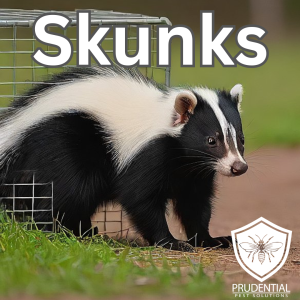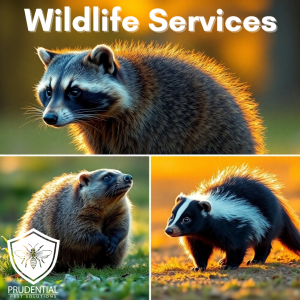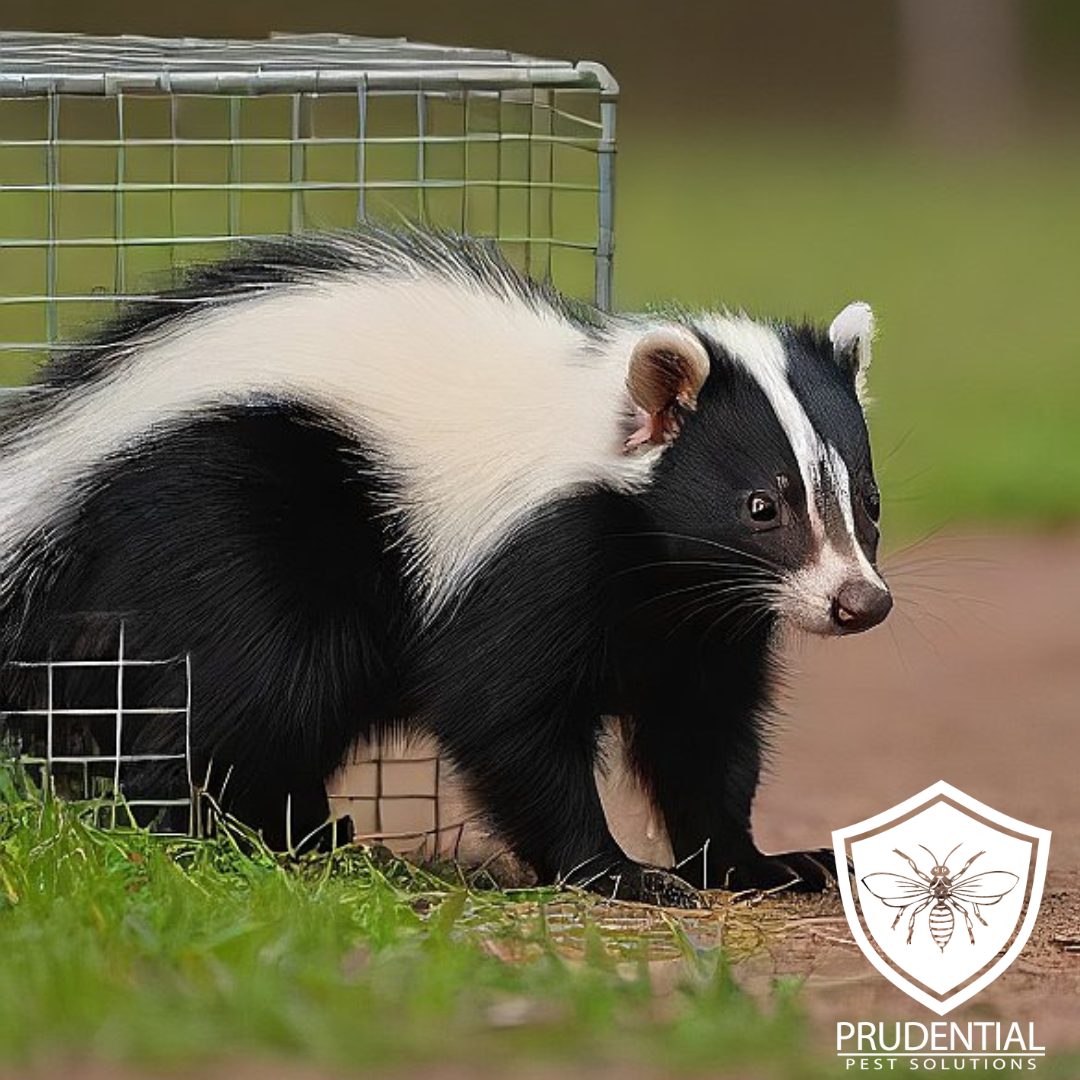Skunk Control Chester County

skunk removal
Skunk Control in Chester County includes trapping, removal, exclusion, repelling, and prevention. Our licensed and insured wildlife technicians are skilled at handling skunks in a humane and effective manner. Since we have our licenses through the State of Pennsylvania, and permits through the Pennsylvania Game Commission, you can be confident that we will resolve your wildlife issue.
Chester County is home to many species of nuisance wildlife. Some of the common wildlife species we handle and remove include:

wildlife removal services
- Squirrels
- Groundhogs
- Skunks
- Raccoons
- Birds
- Bats
- Snakes
- And many more!
Ground burrowing animals
Common ground burrowing animals prevalent in Chester County include skunks and groundhogs. These animals are built for digging and excavating soil to build their dens. Most homeowners that have skunk or groundhog issues usually have the animal building a den close to the house or under a shed, porch, or deck.
Den holes for these species are typically 6-12 inches in diameter and can be quite deep and extensive. The den hole may be under a shed, porch, or deck and you may not even see the hole itself. The dens usually will have one main entrance/exit and one emergency exit located within 10 feet of the primary opening. Some of our Chester County clients will have a groundhog issue one year and the next year a skunk moves into the former groundhog hole.
Treatment for groundhogs and skunks
If the animal has burrowed under a shed, porch, deck, or at the foundation of the home, then trapping is the most effective method for animal removal. Trapping is the act of physically capturing the animal and removing it from the property. The most common type of trapping is live capture box trapping. This type of trapping involves placing a live capture trap with bait inside. The animal enters the trap, triggers the mechanism, and becomes trapped.
Since we have a permit from the Game Commission, we have the knowledge and ability to successfully handle a trapped animal. We always check the traps every 24 hours and remove any trapped animal so as not to cause any more undue stress to the animal. Knowing what to do after the trapped animal is removed from the property is vitally important. We will never release an animal that will cause problems to some other property owner and always handle all captures in accordance to Game Commission rules and regulations.
Other methods for treating ground burrowing animals include lethal trapping and lethal fumigants. If the den hole is not under a structure, then a poison fumigant can be effective. This process involves lighting a poison gas cartridge and placing it directly into the den. Always read and follow the label on the fumigant cartridge. Lethal trapping involves the use of body gripping traps over the den opening. This type of trapping should be reserved for professionals and should only be utilized when kids, humans, pets, and non-target species are not present.
If you decide to trap an animal yourself, we can help after you successfully capture the animal. Whether you intended to catch the neighborhood skunk or not, we can remove the animal from your property and return your equipment. From full service trapping services, to just animal removal after you catch the animal, Prudential Pest Solutions can help with your skunk and groundhog issues.
Skunk Exclusion
If the skunk has made its den out in a field or not under a structure, then simply filling in the den opening with soil and stone is a good method for closing the den. When the den was made under a porch, shed, or deck, we have a proven method for preventing future animal invasions. Since these animals are excellent diggers, our exclusion method involves installing a barrier that extends into the ground at least 18-24 inches.
We utilize ½ metal hardware cloth to keep skunks and groundhogs from going under your porch, deck, or shed. We excavate a trench approximately 12 inches wide by 18-24 inches deep. The hardware cloth is then screwed to the shed, porch, or deck and extended into the trench. The bottom of the hardware cloth in the trench is then bent outwards to form a base. The trench is then filled back in and your porch, shed, or deck is not wildlife proofed.
Since most the exclusion is below ground, most of the hardware cloth is unseen. For the above ground portion of the hardware cloth where it is connected to the shed, porch, or deck, we make sure that it looks good and is functional. This sometimes includes the use of composite decking on the sides of concrete porches to hold the hardware cloth and camouflage the screening. All of our exclusion projects include a warranty, so you won’t have to worry about that skunk or groundhog returning.
Skunk Spraying
A lot of clients ask me how to not get sprayed. My answer is simple, move slowly and don’t stress the animal. Easier said then done, but with all wild animals, if you move and speak slowly and calmly, they often will be calm.
When trapping for groundhogs, skunks, opossum, or raccoons, always cover your trap. You can cover your trap with a sheet, towel, wood, or anything that will keep the trap covered. When a skunk is captured, the covered trap will be easier to approach and handle and will reduce your chances of getting sprayed. Avoid any jerky movements when moving a trap that has a skunk in it.
Sometimes, even with experience, we get sprayed by a skunk. The discharge from the skunk is oil based which is why it tends to linger for so long. When I have been sprayed by a skunk, I use vinegar as my product of choice. Remove your clothing and apply the vinegar using a paper towel. My clothes then go right into the wash and I head right into the shower. Since our noses will block out a smell after a certain amount of time, you may still smell like a skunk and not realize it. Don’t worry, if you still smell like a skunk your spouse will tell you right away. If you really want to see if you still smell like a skunk, just head out in public and watch for people’s reactions when they are around you. Not very scientific but your fellow human will not disguise their disgust for your skunk odor.
Skunk Prevention
Skunks are on your property for 3 reasons. They either have a den on your property, there is food on your property, or they are looking for a mate. We covered the common den areas in the above section so let’s explore some food options. Skunks are opportunistic animals that are omnivores. Cat food left out, garbage, bird seed, and grubs are common skunk food sources in residential areas. Depending on the time of year, a simple grub treatment on your yard can eliminate their food source and they will move on.
Mating season is from January through the end of March in Chester County. Skunks will travel great distances to find a mate. There is nothing you can do to prevent a skunk that is only there to find a mate. In fact, eliminating food sources and den opportunities are the best skunk prevention tips we offer. Even if you don’t have a skunk living under your shed, porch, or deck, we can install the hardware cloth as a preventative measure.
We will get you skunk free
Our experienced wildlife technicians can handle your skunk issue humanely, quickly, and effectively. We are experts in skunk control and will make sure they don’t come back to your property. Even if you want to trap the animal yourself, we can remove the animal from your property so you don’t have to handle it. Our full-service wildlife division is here to help! Give us call or send us a message to get rid of your skunks today!

Comments are closed